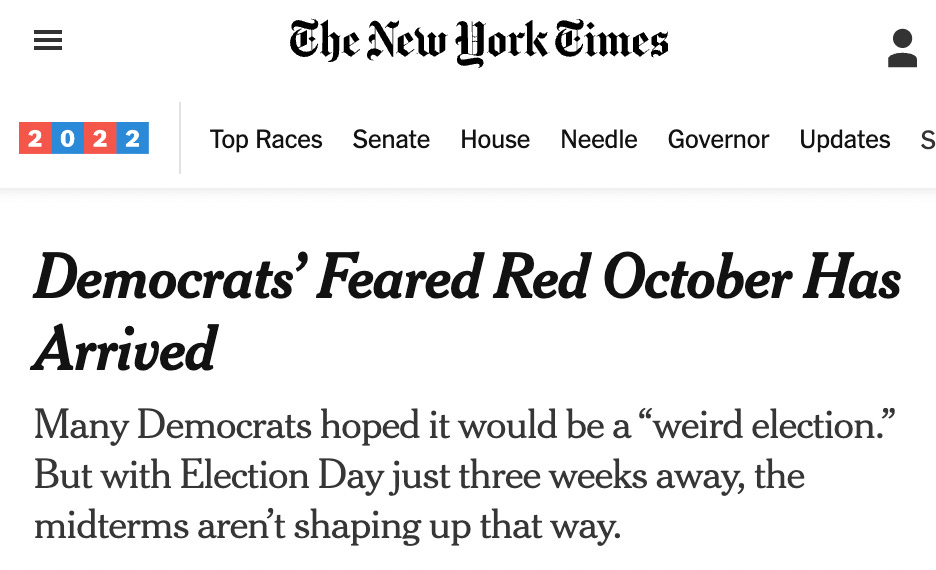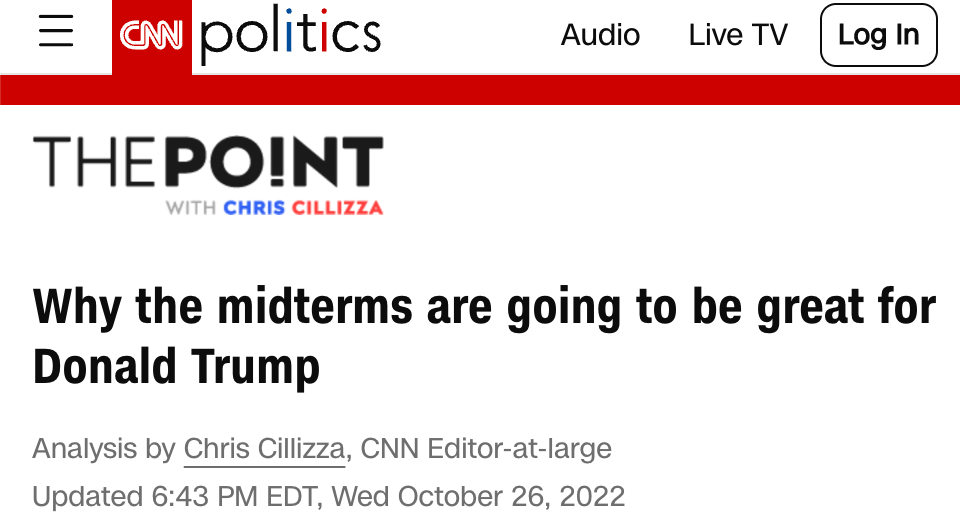Political media is broken
On October 19, 2022, the New York Times — America's "paper of record" — ran a story with the headline, "Democrats’ Feared Red October Has Arrived." The purpose of the story was to explain why the Democrats will lose badly in the midterm election, which was still nearly three weeks away.
"When [elections] break, they usually break in one direction," reporter Blake Hounshell wrote. "And right now, all the indicators on my political dashboard are blinking red — as in, toward Republicans."
Hounshell asserted the reason why Democrats would do poorly is that they focused too much attention on reproductive rights. According to Hounshell, "[a]ll those abortion ads have taken resources away from whacking Republicans for opposing the policies Democrats passed in Congress this year."
As proof, Hounshell noted that "even in wicked-blue Rhode Island, the Republican nominee in one of the state’s two congressional districts, Allan Fung, is leading Seth Magaziner, the state treasurer and a Democrat, in public polls."
About a week later, on October 25, the New York Times published a similar story under the headline, "Democrats, on Defense in Blue States, Brace for a Red Wave in the House." The piece, by politics reporter Shane Goldmacher, claimed there are "growing signs that voters are poised to punish President Biden’s party." Relying on Super PAC spending data, Goldmacher concluded that Democrats "have all but given up contesting more Republican terrain won by Donald J. Trump, putting the party heavily on the defensive." Goldmacher again touted Republican Allan Fung, saying he "could now deliver Republicans their first House seat in [Rhode Island] this millennium."
The style and tenor of the New York Times' political coverage were not uncommon. Axios, an influential online political publication, ran numerous articles about the "growing red wave" or "red tsunami."
"Voters appear ready to blame Democrats for economy, inflation," Politico asserted on the eve of the election.
On CNN, Editor-at-large Chris Cillizza wrote that "all signs are pointing to a strong Republican showing." Trump, Cillizza predicted, "will cast himself as the reason behind Republican gains and attempt to use it as a springboard for a campaign launch that could come shortly after."
All of these forecasts, and many similar predictions published in other outlets, turned out to be wrong. There was no red wave. Magaziner won reelection in Rhode Island by three points. As of this writing, control of the House and Senate are still up in the air while votes continue to be counted.
But even if media predictions were correct, they represent a style of political reporting that is dysfunctional. Campaign coverage is increasingly focused on anticipating who will win through polling analysis. But politics is unpredictable, and polls are not nearly precise enough to predict the outcome of a close contest.
Polls have a number of limiting factors. Pollsters can't know for certain if the people who answer the poll are representative of the population that will actually vote. Most pollsters end up making adjustments to match the expected composition of the electorate. But that is just a guess, using assumptions from turnout in previous elections. The process of finding a representative sample has gotten even harder as more people rely exclusively on cell phones and screen unknown numbers.
In 2016, the same publications that predicted a Republican "red wave" on Tuesday predicted that Hillary Clinton would easily win the presidency. More and more political coverage treats elections like a horse race, even though this approach has repeatedly proven useless.
Prediction-based coverage comes at a high cost because it crowds out the coverage that voters actually need. To make an informed decision, voters need to know the practical impact of voting for each candidate.
In the case of the 2022 midterms, if Republicans regain control of the House, they will use the threat of a global economic collapse to try to force benefit cuts to Social Security and Medicare. We don't have to speculate about this. We know it is true because Republican leaders have said it publicly. But, as Popular Information previously reported, major publications almost completely ignored the potential impact of the election on Social Security and Medicare.
The political media has substituted polling analysis, which is something only people managing campaigns really need, for substantive analysis of the positions of the candidates, something that voters need.
Why polling is getting worse
After each campaign cycle, certain pollsters are congratulated for their accuracy, and others are derided for getting it wrong. In 2016 and 2020, Trump overperformed compared to his standing in most polls. So the most "accurate" polls in recent cycles were conducted by partisan Republican pollsters, like Trafalgar Group.
This run of "success" raised the profile of right-wing pollsters and caused the media to become less skeptical. The New York Times noted that while traditional media organizations cut back on the number of polls they commissioned, "there has been a wave of polls by firms like the Trafalgar Group, Rasmussen Reports, Insider Advantage and others that have tended to produce much more Republican-friendly results than the traditional pollsters." These Republican pollsters do not "adhere to industry standards for transparency or data collection."
Trafalgar, after conducting only a handful of polls in the 2018 midterm, produced 48 polls of Congressional races in 2022, the most of any pollster. And aggregation sites like FiveThirtyEight rate Trafalgar highly, giving it even more influence.
But is Trafalgar, which only started in 2016, really accurate? A November 1 poll by Trafalgar in New Hampshire found Republican Don Bolduc leading Democratic Senator Maggie Hassan by 1.3 points. Hassan won by nearly 10 points. A November 7 poll by Trafalger in Michigan found Republican Tudor Dixon leading Democratic Governor Gretchen Whitmer by 0.3 points. Whitmer won by almost 9 points. A November 3 poll by Trafalgar in Pennsylvania found Republican Mehmet Oz leading Democrat John Fetterman by 2 points. Fetterman won by more than 3 points.
These results suggest that Trafalgar isn't actually a better pollster than its competitors. In 2022, another pollster will be the "most accurate." If you have a lot of pollsters producing a variety of results, someone will be the closest.





Not only are all your points valid--this is dysfunctional and misleading reporting, and takes up space that could be devoted to actually explaining the impacts of the two parties (or candidates in single races) policies, but in the current political climate it is dangerous.
It doesn't seem to have happened yet, but still could in Nevada, Georgia, or especially Arizona, but a narrow win for the Democrat, after the media published all of these articles presupposing Republican wins, could easily result in repeats of "Stop the Steal" violence and intimidation.
It was hard for me because I'm a news junkie, but I cancelled my NYT subscription over this issue, and I am hanging onto my WaPo subscription by a thread after I got the election day Opinion newsletter touting the FOUR opinion columns all complaining about all the things Democrats had done wrong that led to their massive losses--before ED voting had even started.
Not only does the political media have a polling problem, Judd. They also have a problem adjusting their narrative and connecting with real people. Even on MSNBC during their election coverage the panel (with a notable exception) seemed truly shocked that the red wave didn’t materialize and had some difficulty figuring out that reproductive rights and threats to democracy motivated voters this election cycle.
It’s like they learned in their Political Science classes that the President always loses seats in the midterms and “it’s the economy, stupid” is gospel and have no ability to see that maybe this time, for once, it really was different.